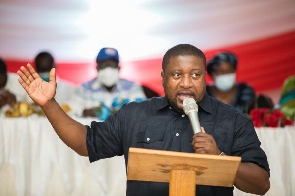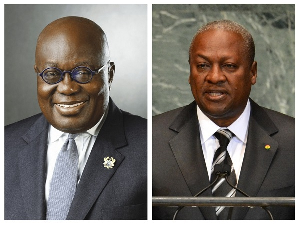 ExxonMobil has pulled out of exploration activities in Ghana
ExxonMobil has pulled out of exploration activities in Ghana
• ExxonMobil has pulled out of exploration activities in Ghana
• The company explained it was unwilling to enter an extension of its contract signed back in 2018
• ExxonMobil prior to its existing Ghana controlled 80% of the Deepwater Cape Three Point Block in the Western Region
The exit of ExxonMobil’s activities, a US-based oil and gas firm from Ghana’s oil fields could spell doom for the country's upstream sector, a former Minister for Energy, Kofi Buah has opined.
According to him, the sector is on the verge of a collapse unless government implements stringent measures to save it.
In an opinion piece sighted by GhanaWeb, Kofi Buah said “In January 2017 when this government began, Ghana had 16 offshore licences: three were producing fields-Jubilee, TEN and Sankofa Gye Nyame; Hess Pecan Field-Deepwater Tano Cape Three Points was appraised and ready for development; Hess left and sold out to Aker and the rest was history. That field is still begging to be developed.”
He revealed some 12 blocks in exploration stages had obligations to either acquire some amount of 2D or 3D seismic and or drill an exploration well with negotiation well conducted by the erstwhile John Mahama administration.
“But from 2017 to date, only four exploration wells have been drilled by AGM (2 wells under amended terms-if you recall these amended terms reduced Ghana’s take from 43 percent to 18 percent. Eni (1 well) and Springfield (1 well) for which three oil and gas discoveries were made.”
“Thanks to the good leadership under the NDC, the only producing fields in Ghana today are Jubilee, Sankofa and TEN fields, none has been added. Unfortunately, these fields are declining as we continue production each day of the year. Jubilee has been producing oil and gas since 2010. We have already produced about 50 percent of the Field Reserves.”
“TEN and Sankofa are also going down. If exploration is not prioritised, the industry will die off. If Ghana does not find more hydrocarbon resources and develop these fields, the worse fear is that the service industry, which is already feeling the impact of the lack of activity and is dying slowly, will go into bankruptcy if the trend continues and this must worry well-meaning Ghanaians,” Kofi Buah stressed.
ExxonMobil prior to formally withdrawing its activities in Ghana controlled 80 percent of the Deepwater Cape Three Point Block with the Ghana National Petroleum Corporation holding 15 percent and Goil Offshore Ghana Ltd having the remaining 5 percent.
Though the oil and gas firm did not provide further details of its decision, it thanks the Government of Ghana “for the good and constructive relationship we have enjoyed over the years”
Read Kofi Buah’s write up below:
Below is the full opinion piece by Hon. Kofi Armah Buah
GHANA’s UPSTREAM PETROLEUM SECTOR ON LIFE SUPPORT WITH THE EXIT OF EXXONMOBIL- KOFI BUAH
• In January 2017 when this government began, this was the state of Ghana’s upstream petroleum sector
.Ghana had 16 offshore licenses.
• 3 were producing fields-Jubilee, TEN and Sankofa Gye Nyame
• Hess Pecan Field-Deepwater Tano Cape Three Points was appraised and ready for development- Hess Left and sold out to Aker and the rest was history. That field is still begging to be developed.
• 12 blocks in exploration stages all had obligations to either acquire some amount of 2D or 3D seismic and or drill an exploration well. This obligation was well negotaited for in the various Petroleum Agreements signed by the then government.
• From 2017 to date, only 4 explorations wells have been drilled by AGM (2 wells under amended terms- if you recall these amended terms reduced Ghana’s take from 43% to 18%. Eni (1 well) and Springfield (1 well) for which 3 oil and gas discoveries were made. The question must be asked-How is it that most of the operators are not perofrming as expected? If the companies are breaching termination clauses in the various Petroleum Agreements, why are the Agreements not being terminated? Under the NDC government 3 non performing petroleum agreements were terminated as required by law.
• In 2018, ExxonMobil entered Ghana under pump and pagentry having been given very juicy terms by the government. The petroleum agreement signing ceremony was done at the flagstaff house by President Akuffo Addo himself a clear departure from the normal practice where the minister of Energy normally supervise the signing ceremony.
They were obligated to acquire 3D seismic and later drill an exploration well. Having enjoyed preferntial treatment in the sector, most Ghanaians and industry watchers were expecting an aggressive exploration on their Block.
ExxonMobil managed to license data from a seismic contractor called PGS and worked on the data. It was expected that Exxonmobil will go ahead after the geological and geophysical study to drill the obligated well. However, ExxonMobil has served notice to the Ghana Ministry of Energy that they will not continue into the next phase to drill the exploration well.
• In 2018, Government organised Block licensing rounds which was publicised around the world. It was reported that 3 companies won blocks offshore Ghana. However from 2018 to date, not much has been done to award the blocks to ensure that exploration activities pick up.
• Thanks to the good leadership under the NDC, the only producing fields in Ghana today are Jubilee, Sankofa and TEN fields, non has been added, unfortunately these fields are declining as we continue production each day of the year. Jubilee has been producing oil and gas since 2010. We have already produced about 50% of the Field Reserves.
TEN and Sankofa are also going down. If exploration is not prioritized, the industry will die off. If Ghana does not find more hydrocarbon resources, and develop these fields, the worse fear is that the service industry which is already feeling the impact of the lack of activity and is dying slowly will go into bankruptcy if the trend continues and this must worry well meaning Ghanaians. It is only fair to ask the question-Is Ghana loosing its place as the preferred investment destination of the upstream sector in the sub-region under this government?
- Dangote cuts Nigeria fuel prices for third time since March
- GNPC faces overhaul amid global energy shift
- Nigeria to compel oil firms to sell crude to domestic refineries
- Nigerian crude sells at premium but weak output, high cost could hurt economy
- Mahama meets members of Ghana Upstream Petroleum Chamber
- Read all related articles










